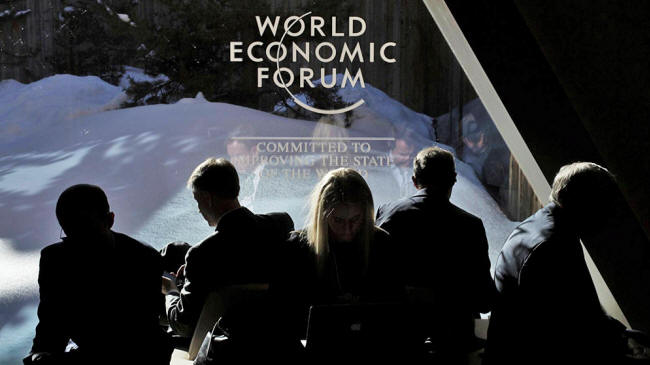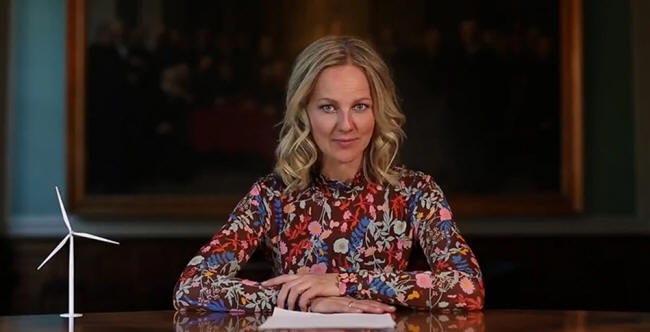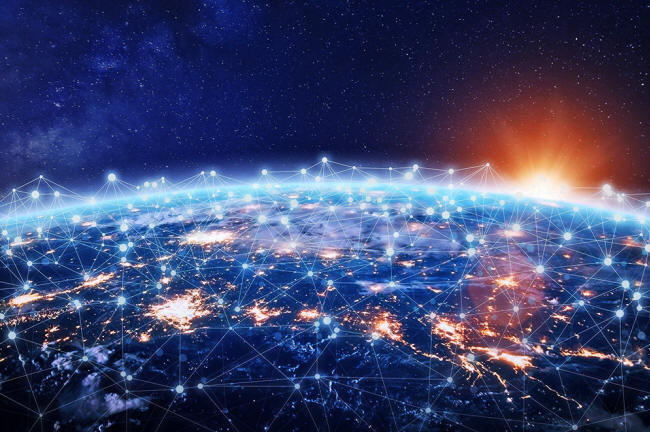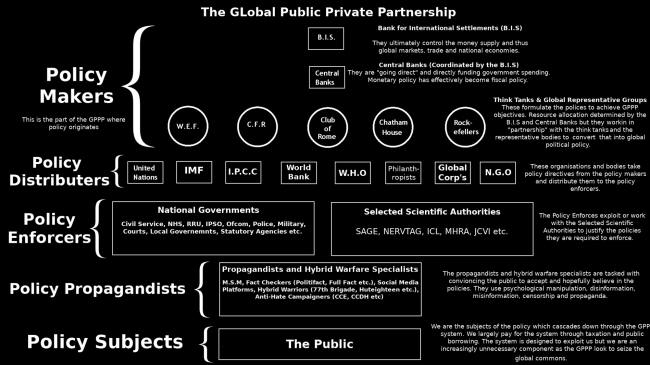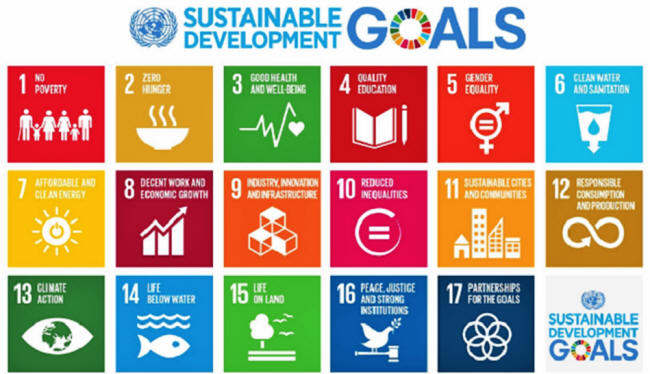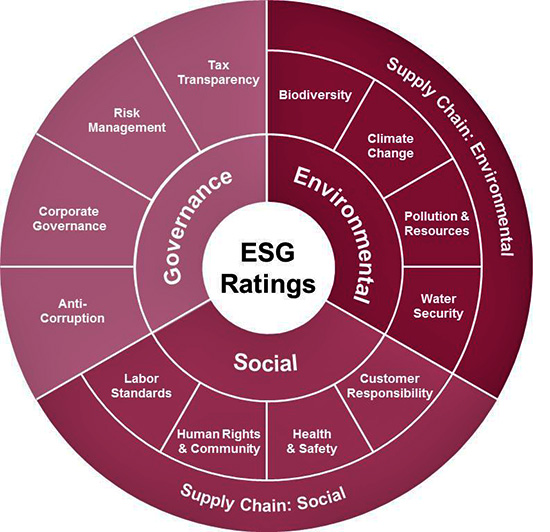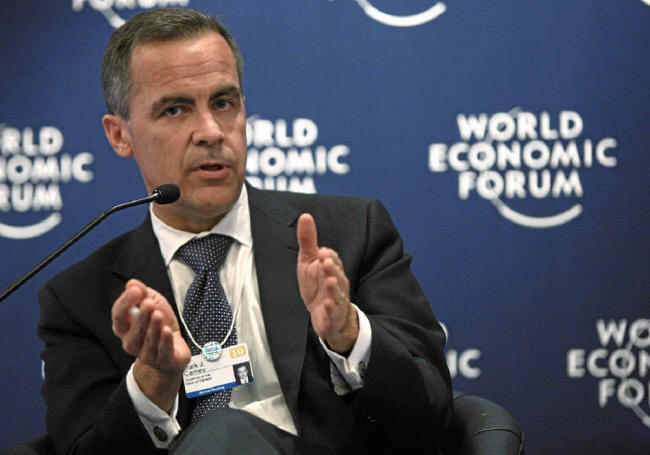|
from
Off-Guardian Website
October 27, 2021
The people who none of us elect, who ultimately control international finance, all corporate & business activity, government policy and international relations have constructed a system that will enable them to seize the "global commons."
They are the Global Public Private Partnership (GPPP) and while elected representatives are within their ranks, they don't set either the agenda or policy. We need to both recognise who the GPPP are and understand the implications of their gambit.
How are this group of global stakeholders going to seize the global commons and why should we resist them?
Over the next couple of articles we are going to explore these questions. By recognising what the globalist think tanks and other policy makers mean by the global commons we can begin to appreciate the jaw dropping magnitude of their ambitions.
They consistently use deceptive language to conceal their intentions. Words like 'inclusive,' 'sustainable,' 'equity' and 'resilience' are often employed to portray some vague but ultimately duplicitous concept of caring environmentalism.
We must unpick their language to fully comprehend their intentions, in the hope that we can resist and deny them.
While we have been distracted and transitioned by the alleged global pandemic, or pseudopandemic, the Global Public Private Partnership (GPPP), who orchestrated the chaos, have been very busy. They have created the asset rating system that will afford them total, global economic control.
This is based upon Sustainable Development Goals (SDGs) and utilizes Stakeholder Capitalism Metrics (SCM).
This new global economic system is what the politicians mean by "build back better." It is the essence of the World Economic Forum's Great Reset.
laying the foundations for a new International Monetary and Financial System (IMFS) was a key to the pseudopandemic. The new IMFS will emerge from the deliberate economic destruction wrought by government policy responses to COVID 19. This was planned.
The phrase "build back better" was first widely popularized by US President Clinton following the 2004 Indonesian tsunami. During the pseudopandemic it has been adopted by politicians globally to signal that the project to seize the "global commons" is underway.
We will need to consider UN Agenda 21 and 2030 in more detail, as these are key the theft of all resources, but for now we can reference it to understand what "build back better" actually means.
This will explain why politicians around the world have used it.
Sustainable Development Goal (SDG) 11 (b) of Agenda 2030 states:
The Sendai Framework for Disaster Risk Reduction (SFDRR), written in 2015, states:
Clear vision, plans, competence, guidance and coordination within and across sectors, as well as participation of relevant stakeholders, are needed... and fosters collaboration and partnership across mechanisms and institutions for the implementation of instruments relevant to disaster risk reduction and sustainable development.
"Build back better" policy was prepared ahead of the arrival of COVID-19.
It is part of the planned risk management and preparedness framework for post "disaster" reconstruction. It means the global participation of relevant stakeholders to strengthen international cooperation and global partnerships in order to implement instruments to achieve sustainable development.
SDG 11 (b) was a plan to substantially increase the global number of human settlements adopting "build back better" polices by 2020.
This SDG has now been achieved thanks to the COVID-19 pseudopandemic.
In particular, the planned "mobilization of risk-sensitive investment," outlined in the SFDRR, has surged ahead.
Stakeholder Capitalism Metrics - SCM - were devised by the World Economic Forum, who describe themselves as the international organization for public-private cooperation.
When combined with the SDGs outlined in the UN Agenda 21 and 2030 frameworks, SCM enable the GPPP to seize the entire Earth, all its resources and everything on it, including us.
In order to control us we are being transitioned into a technocracy with the biosecurity state acting as the central control mechanism. Public health is the new focus for global security and centralised control of the entire system has been established during, and as a result of, the pseudopandemic.
The news IMFS is designed to tie our biosecurity commitments to Universal Basic Income (UBI or similar state payments) which will be paid with Central Bank Digital Currency (CBDC.)
This will ensure our compliance, as Central Banks will use AI algorithms, combined with population monitoring (track and trace, vaccine passports or some other form of social credit surveillance system), to monitor and control all of our transactions, behavior and movements.
The dreaded authoritarian knock on the door will be replaced with the dreaded authoritarian beep of a refused card payment. If you can't buy food with your money it doesn't really matter how much of it you have.
Comply or starve is a distinct possibility...
Over the next couple of articles we are going to explore this "new abnormal." How it encapsulates the seizure of everything by favoured stakeholder capitalists, as the chosen winning corporations divide up the Earths resources amongst themselves.
This is the zenith of the planned "build back better" response to the pseudopandemic.
Throughout the pseudopandemic the World Economic Forum (WEF) have taken the public relations lead on the planned recovery. Their Great Reset is just the repackaging of an idea hundreds, if not thousands of years old.
It is the self-serving belief that some special people are destined, and therefore have the right, to lead the rest of us. They don't require any kind of legitimate "democratic" mandate or even popular support. Their claimed right to rule is an imperious assumption.
The WEF have claimed the supposed right to direct three key areas of global policy. They intend to do this by assisting world leaders to manage "disruptive change."
They have put themselves forward as the GPPP front organisation for managing the fourth industrial revolution, addressing global security issues and solving the problems of the global commons. It is important to note that the WEF are not alone in their ambitions, but rather the leading proponents for the wider GPPP policy platform.
We will focus on the third sphere of their self-proclaimed authority: control of a global commons.
The United Nations (UN) acts as a policy hub for the GPPP. It allows stakeholders to introduce the policies, formulated by the think tanks, into the nascent global governance structure. The desired policy agendas can be moulded and eventually filtered down to national and then local government administrations across the planet.
In the September 2011 issue of Our Planet the UN offered a description of the global commons as,
In 2013 the UN Systems Task Team expanded on this and published "Global governance and governance of the global commons in the global partnership for development beyond 2015."
They wrote:
This habit of expanding the definition of the global commons has continued.
In April 2020 The Rothschild backed bank the Global Environment Facility offered a more extensive list of the shared resources all life relies upon:
That coalition is the GPPP and citizens are involved, via civil society, only if they agree to promote the agreed policy agenda.
In December 2020 the Secretary General of the UN Antonio Gutteres really fleshed out the global commons concept.
Speaking to an audience gathered at Columbia University, the pivotal academic institution in the development of Technocracy, he said:
Again we see the recurrent themes of the GPPP.
The planet must be saved from us, we are a pestilence that must be controlled; Covid-19 is, as ever, an opportunity to transform the global economy; our survival and GPPP stewardship of the global commons are one and the same and everything must be transformed.
Not only are the oceans (everything in them and beneath them), the atmosphere (the air we breath), Antarctica (the only continent with a universally respected international treaty protecting it) and the universe up for grabs, GPPP avarice doesn't end there.
Energy (all natural resources), all productivity and our livelihoods (the workplace), biodiversity (ecosystems and life on Earth), all land (managed conservation areas), agriculture and fisheries (all food), our consumption and behavior (carbon footprints), where we are allowed to exist (planetary boundaries), our political opinions and system, education, the communities we live in and even our relationships, are all to be controlled and transformed by the GPPP.
The "global commons" is GPPP shorthand for everything. All life, all resources, all land, all water, the air, the stars and all of us. It is their intention to have dominion over all.
The global commons are not fixed. Other aspects of our existence are being added all the time. In June 2021 the WEF wrote the Case for a Digital Commons.
Whenever they want to include something else in the list they use the language of sustainable development.
It doesn't matter that this makes no rational sense, the point is to sell the notion with the right buzz-words:
Now they claim the authority to rule the Internet and all digital communication technology.
We see once more that the pseudopandemic is the catalyst for this transformation and that government is merely the implementation partner for the GPPP agenda.
We are just the tax paying cash cows that will fund the construction of the empire:
It is truly remarkable that a low mortality respiratory disease has provided such an immense opportunity for global transformation.
The leading figures within the GPPP knew that COVID-19 didn't present much of a threat.
In their June 2020 book Covid-19 - The Great Reset, the authors Klaus Schwab and Thierry Malleret wrote that the pseudopandemic was:
At the heart of this seizure of everything lies stakeholder capitalism.
In December 2019 Schwab wrote What Kind of Capitalism Do We Want?.
The "we" referenced in that title was not "us" but rather the GPPP, though the article assumed we all agree on the GPPP's definition of global problems. Schwab wrote:
Schwab's use of the term "trustee" is notable.
It has a specific legal definition:
It is not at all evident that global corporations should be entrusted with our society.
Many of us would disagree which is one of the main reasons we haven't been asked. There is no justification for Schwab's claim.
I speak for no one but myself, but I would wager that most people consider global corporations to be a significant contributor to the social and environmental challenges we face.
Why would anyone believe they should determine the alleged solutions?
Schwab's is a ludicrous assertion. Yet this is the insistence of the stakeholder capitalists. It is also the basis for the UN Sustainable Development Goals and their Agenda 21 and 2030 policy platforms.
Despite their claims of omniscience, the GPPP and their leading proponents, like the WEF and the IMF, are not infallible. They are just people, no different in most regards to anyone else on Earth.
They are collaborating in a huge, though not unprecedented, global effort. Many people have come to think an operation on this scale is impossible. Why they imagine this is hard to say.
We have already had two world wars requiring similar degrees of international cooperation. Arguably more if we consider that whole populations were engaged in these collective efforts.
There are many global corporations that operate tortuously complex international operations.
These incorporate global logistics, international finance and cross border regulatory alignment. These world-wide endeavours overwhelmingly rely upon a hierarchical, authoritarian management structure.
Only a few, senior board level figures have oversight of the whole system. The GPPP relies upon exactly the same.
However, because ordinary people are leading this organisation, mistakes happen.
In September 2020 the WEF produced a promotional video making the point, from their perspective, that,
This backfired terribly and was a PR disaster. The Video was hastily pulled down, too late to hide the real intention of the GPPP.
However, the original article, upon which the video was based, can still be read.
The article was written by the former Danish Environment Minister, climate activist and WEF "young global leader," Ida Auken.
Unlike most of us, she isn't a disenfranchised constituent. Ida is a carefully selected GPPP spokeswoman.
Ida Auken
The title was changed and an explanatory note added.
Ida said that her article was not intended to describe her "utopia" and that the intention was to explore the "pros and cons" of a possible near term future:
The offer from the GPPP is clear.
Why, is the obvious question.
We would no longer be required in such a system...
Certainly loosing "way too many people" would suggest at least acknowledgment of a much smaller global population.
We should also note why Ida's envisaged future becomes necessary. It is, just as we have seen with the COVID 19 opportunity, a response to a set of crises which gives rise to doing "things differently."
We are already seeing the knock-on effects of the COVID-19 lockdowns and economic destruction. An approaching set of crises over the next few years is a reasonable prediction.
As Schwab noted, there was no existential threat. The consequent disasters we are likely to face will be the result of policy promoted by GPPP representatives, like the World Health Organization (WHO), not a respiratory disease.
It would be easy to dismiss Ida's musings as simply the wishful thinking of an ideologue. In part, it probably is.
However, when we look at Agenda 21 and 2030 an uncomfortable realization dawns.
While the sustainable development agenda is couched in terms of environmental concerns and apparent humanitarian principles, the detail of the proposed policies presents an entirely different prospect.
The true horror of Ida's vision is not that she is among the tiny clique GPPP representatives who are committed to constructing this dystopian prison planet, it is that, in Agenda 21 and 2030, the policy framework to make her futurescape a reality already exists.
Make no mistake, the GPPP intend to control every aspect of the Earth and our lives.
That is the transformation they are working towards and they have used the pseudopandemic to set that transition in motion. There is no political opposition to the GPPP. They are realpolitik entire.
All they need, for their "solutions" to close the trap, is our compliance.
Combined with SDGs, while we have been preoccupied with a low mortality respiratory illness, the GPPP have not only started building, they have partly completed the new global monetary and financial system.
Once installed this will finalise their coup d'état and enable them to seize everything, all under the guise of stewardship of the global commons.
We will explore how this has been done, and the remaining elements needed to accomplish the theft, in Part Two below...
We are now going to look at how systems have been established to enable those stakeholders to seize them.
We should be mindful of what "global commons" means for the Global Public Private Partnership (GPPP).
For them it means possession of everything: every resource on the planet, all land, all water, the air we breath and the natural world in its entirety, including all of us.
Principles of the Global Commons
The notion of the "global commons" sprang from an amalgam of two principles in International Law. In his 1968 paper on the ToC, the U.S. ecologist and eugenicist Garrett Hardin, building upon the earlier work of the 19th century economist William Forster Lloyd, outlined the population and resource problems as he saw them.
He said,
While logically this is ultimately true, if a whole raft of assumptions are accepted, the point at which zero population growth becomes necessary is unknown.
The evidence suggests we are nowhere near that limit.
Eugenicists, like Hardin, have claimed and continue to claim that the Earth faces a population problem. There is no evidence to support their view.
Hardin theorized that when a resource, such as land, is shared in "common," people acting in rational self-interest will tend to increase their use of that resource because the cost is spread among all. He called this type of thinking a tragedy because, if all act accordingly, he maintained that the resource would dwindle to nothing and everyone suffer as a result.
Hardin insisted that this tragedy could not be averted.
Therefore, as human beings were, in his eyes, incapable of grasping the bigger picture, the solutions were "managed" access to resources and "population control."
While Hardin's elitist ToC concept suggested regulated, enclosed (private) access to "common" resources, the Common Heritage of Mankind (CHM) rejected the idea of enclosure (privatization).
CHM instead advocated that a special group should be created by international treaty as "trustees" of the global commons. Seen as more "progressive," it was no less elitist that Hardin's concept.
The philosophical concept of CHM emerged onto the global political stage in the 1950's but is was the 1967 speech by the Maltese ambassador to the U.N., Arvid Pardo, which established it as a principle of global governance.
This eventually led to the 1982 U.N. Convention on Law of the Sea (LOSC).
Citing the CHM, in Article 137(2) of the LOSC, the U.N. declared:
That "Area", in this case, was the the Earth's oceans, including everything in and beneath them.
The "authority" was defined in Section 4 as the International Seabed Authority (ISA). Article 137(2) of the LOSC is self contradictory.
The legal definition of "vested" implies that the whole of humanity, without exception, has an absolute right to access the global commons. In this instance, those commons were the oceans. While the legal definition speaks of ownership, "vested" seems to guarantee the no one can lay any individual claim to ownership of the oceans or its resources.
Access is equally shared by all.
Supposedly, this alleged right can never be,
This is repudiated entirely by,
Who among the billions of Earth's inhabitants gave the ISA this alleged authority?
When were we asked if we wanted to cede our collective responsibility for the oceans to the ISA?
This authority was seized by U.N. diktat and nothing more. It is now the ISA who, by a condition precedent, control, limit and license our access to the oceans.
This is the essential deception at the heart of GPPP's "global commons" paradigm.
They sell their theft as stewardship of the resources vested in all humanity, while simultaneously seizing the entirety of those resources for themselves.
Seizing The Global Commons: The Oceans
When interpreted by International Law, the CHM appears to place the private ownership of the global commons, suggested by the ToC, beyond the reach of government stakeholder partners.
They should have no more right to these riches than anyone else. Legal challenge to any claim should be a relatively straight forward process for any concerned individual or group minded to make one.
This is not even a remote possibility. International Law, as it pertains to the global commons, is a meaningless jumble of inconsistencies and contradictions that ultimately amounts to "might is right."
For anyone to challenge the GPPP's claim they would need to retain a legal team capable of defeating the UN's and a judiciary willing to find in their favour.
The "law" is ostensibly designed to leave us imagining that we have "protected" rights and responsibilities towards these shared resources.
Whereas, if subjected to any reasonable scrutiny, the legal notion of the global commons looks more like a diversion to facilitate a robbery. If we look at the ISA's record of stakeholder engagement we quickly find their Strategic Plan for 2019 - 2020.
This succinctly outlines how the scam operates:
The shared resource - global commons - of the Earth's oceans are not freely accessible to humanity as a whole anymore.
Rather, the ISA determine who gets access to oceanic resources based upon Sustainable Development Goals (SDGs). Effectively they have turned access to the global commons into a new market.
The most vital questions we must ask is how these allocation decisions are made and by whom. This will reveal who controls these new highly regulated markets.
The ISA state:
In addition, the ISA will:
The Global Public Private Partnership (GPPP) of governments, global corporations (other users of the marine environment), their major shareholders (private investors) and philanthropic foundations (private investors) are the stakeholders.
They, not us, will have an input to ensure the rules, regulations and procedures will promote investment that will safeguard their interests.
In the space of a few short decades, broad concepts have evolved into principles of International Law which have subsequently been applied to create a regulatory framework for controlled access to the all the resources in the oceans.
What was once genuinely a global resource is now the sole province of the GPPP and its network of stakeholder capitalists.
The Global Commons Are Global
We should be wary of falling into the trap of thinking the GPPP comprises solely of the western hegemony. The stories we are fed about the global confrontation between superpowers are often superficial.
While there are undoubtedly tensions within the GPPP, as each player jostles for a bigger slice of the new markets, the GPPP network itself is a truly global collaboration.
This doesn't mean that conflict between nation states is impossible but, as ever, any such conflict will be fought for a reason absent from the official explanation.
SDG's led to net zero policies and they stipulate, among a swath of enforced changes, the end of petrol and diesel transport.
We are all under orders to switch to electric vehicles (EVs) which the vast majority won't be able to afford. In turn, this means a massive increase in demand for lithium-ion batteries.
Manufacturing these will require a lot more cobalt which is widely considered to be the most critical supply chain risk for producing EVs. The World Bank estimate that the growth in demand for cobalt between 2018 and 2050 will be somewhere in the region of 450%.
To say this is a "market opportunity" is a massive understatement.
The ISA have granted 5 cobalt exploration contracts to JOGMEC (Japan), COMRA (China), Russia, the Republic of Korea and CPRM (Brazil). When located deposits become commercially viable, as they undoubtedly will, the corporate feeding frenzy can begin.
Corporations, such as the weapons manufacturer Lockheed Martin, with its wholly owned subsidiary UK Seabed Resources (UKSR), are also among the many ISA stakeholders. UKSR received their exploration license for the South Pacific in 2013.
As an ISA exploration contractor, UKSR stakeholders are free to submit their recommendations for amendments to the ISA regulations governing their own mining operations.
For example, the ISA stated that mining corporations should provide a financial guarantee that would cover,
Lockheed Martin didn't like this at all and so suggested a slight change.
They recommended the addition of the following:
This was presumably because, in their pursuit of SDG "protection" of the planet, Lockheed Martin don't wish to be liable for the environmental damage they will inflict upon it in the process.
This risk of this is high because the proposed method for "scraping the seabed" will almost certainly destroy it.
Fortunately for UKSR and other stakeholders like COMRA, the ISA's is committed to regulations which promote sound commercial principles and safeguard their commercial interests.
Destroying the seabed is a risk worth taking but not if you have to pay for it.
When it comes to fighting climate change, human life is even cheaper.
Nearly all cobalt is currently mined from Africa's copper belt and more than 60% of the world supply comes from the Democratic Republic of the Congo. It is clawed from the Earth by tens of thousands of child slaves.
This poisonous torture dramatically shortens the abject misery of their suffering on this Earth.
However, it does mean other young people like Greta Thunberg can inspire more fortunate children to mobilize on social media, using their fully charged devices, to save the planet.
Only the commercial viability of deep-sea reserves seems capable of saving the cobalt mine slaves. Alas, it is difficult to envisage how deep see reserves will become viable until land based reserves near exhaustion.
This openly condoned child abuse has been ongoing for years. A fact which the world's media admits but never mentions when it eulogises about the green revolution.
The estimated 94,000 tonnes of cobalt in the Clarion Clipperton Zone (CCZ) of the Eastern Pacific alone represents 6 times the known land based reserves.
With total deep sea reserves estimated to be worth between $8 - $16 trillion, as we progress towards a carbon neutral economy, deep sea mining is an inevitability.
Regardless of the environmental cost.
All the real environmental issues are to be ignored as the world embarks upon a transition to a new global economy based upon one highly questionable theory:
The Global Commons New Market(s)
This transition to the green economy will see myriad new markets created as the Earths "common" resources are converted into proverbial investment gold mines.
Cobalt scraped from the seabed is just one example, there are thousands more.
The GPPP will have exclusive access, and thus control, over these new, essential resources. The investment opportunities are endless. It is this prospect, not any concerns for the Earth or humanity, that is driving the seizure of the global commons.
The GPPP have recognised that if they can squeeze something into the "global commons" they can then control of it. Consequently, the list of alleged "commons" continues to grow, as the the GPPP seek more control over more of the planet and everything on it.
In 1996 the late John Perry Barlow, from the Electronic Freedom Foundation, presented a Declaration for the Independence of Cyberspace to the annual Davos conference of the World Economic Forum (WEF).
It perhaps seems odd that the GPPP wanted to hear this radical, libertarian call for governments around the world to leave cyberspace unregulated.
However, as I stress in my book Pseudopandemic, the intent of ideas, political and economic philosophies or social doctrines is not what interests the GPPP. Rather, it is how those ideologies can be exploited to achieve their goals.
In making his address Barlow was, perhaps inadvertently, laying the groundwork to include cyberspace as part of the "global commons." As we shall discuss shortly, the GPPP already had a plan in place to appropriate everything defined as a global commons.
It was this prospect which enthralled the assembled Davos (GPPP) crowd.
In their 2015 Davos executive summary the WEF illustrated how the GPPP manipulate narratives to reshape the context of our daily lives. In this case, the objective was to institute the precepts for their claimed jurisdiction of cyberspace.
What is clear is that we are confronted by profound political, economic, social and, above all, technological transformations... resulting in an entirely 'new global context' for future decision-making...
The World Economic Forum's Annual Meeting provides an unparalleled platform for leaders to develop the necessary insights, ideas and partnerships to respond to this new context...
Based on the principle that a multistakeholder, systemic and future-oriented approach is essential in this new context, the issues to be addressed through sessions, taskforces and private meetings at the Annual Meeting 2015 include... The inability to significantly improve the management and governance of critical global commons, most notably natural resources and cyberspace.
We have considered the example of the oceans and their resources, but the process for creating a regulated markets for all commons is the same. First something must be levered into the category of the global commons.
Once declared to be among the "shared resources all life relies upon," some GPPP quango is appointed to oversee access to the new regulated market.
This body will be formed to serve the stakeholders capitalists who will then have exclusive access to and control of that resource. In accordance with the U.N. definition,
Global governance is formally convened via the process of stealing the global commons.
The entire operation is founded upon sustainable development.
The Agendas For Sustainable Global Commons
As mentioned previously, this plan has been in-place for decades. Sustainable Development Goals (SDGs) are set in Agenda 2030 as way-points along the path to completion of the plan for the 21st century: Agenda 21.
When GPPP stakeholders say they are committed to SDG's they mean Agenda 2030, in the short term, and ultimately Agenda 21.
Agenda 21 has a lot to say about what it calls "human settlements." It lays out how they will be planned, constructed and managed by a public-private partnership.
However, in constructing human settlements, human beings do not appear very high on the priority list.
Objective 5.29 states:
Resource allocation, waste management and environmental protections are the prerequisites for "human settlements." Not the welfare of humanity.
The GPPP will oversee the construction or allocation of our settlements. Objective 7.30. d. states:
All land, not just the commons, will be managed by the GPPP. Again, subsequent Agenda 2030 SDGs have provided the justification for the land grab.
Objective 10 of Agenda 21 states:
Clearly this raises issues of private land ownership and use.
Not just among householders but by industry, farmers, train companies or any other private land owner. The trick in holding on to land will be to secure its designation as having a "sustainable" purpose.
This allocation will need to be agreed by the GPPP, so friends in high places will be key.
Agenda 21 demands, under "Activities" in section 7.29, that all nations must develop:
If the place where you live is deemed to be environmentally fragile, and we are told the whole planet is, then the GPPP will follow section 7.30. h and implement:
This will involve the creation of "protected areas."
Among many of their authoritarian powers, this means that the GPPP will have control of all drinking water. Water sources automatically become "protected areas" under Agenda 21, for the good of our "health."
Activity 18.50 it states:
By exploiting the deception of "sustainable development" a planetary system of global governance, under the auspices of the GPPP, is currently being established.
This is "build back better," the "Great Reset," the "Green New Deal" or whatever the GPPP choose to sell it as. It means GPPP dominion over absolutely everything.
We truly will own nothing, although it seems unlikely that many of us will be happy about it.
Those who do not understand, or do not wish to admit the reality of this global coup d'état, are quick to point out that Agenda 21 - and 2030 - are not legislation.
Nation-states are not compelled to go along with any of it. This observation fails to appreciate what "global governance" is.
Global governance is not the setting of either policy or legislation. It is the creation of policy agendas which individual nation states may or may not implement as policy or subsequent legislation. It can only have teeth if nation states comply.
The problem we face is that nation states are "partner organization," some might say junior partners, within the GPPP. While they remain sovereign entities they do not act as such.
We only need look at how global markets are created by Agenda 21 to see how all nation states have willingly collaborated in the sustainable development scam.
In Agenda 21 the declared "Basis for Action" at section 8.41 states:
The clearly stated plan, written in 1992, was to create,
All sectors and all society will be involved in this effort to transform nature into economic capital.
This will include the oversight of the "activities of society," such as our use of cyberspace, which are,
The global commons in other words.
It doesn't matter if Agenda 21 (2030) has legislative authority or not. All the matters is the complicity of legislative authorities. They are in full compliance.
Agenda 21 proposed the development of "national systems of integrated environmental and economic accounting in all countries." This was envisaged to complete the transformation of the Earth and all of its natural resources into a centralised system of economic control.
As Whitney Webb explored in her excellent article, Wall Street's Takeover of Nature Advances with Launch of New Asset Class that is precisely what has happened.
By once again misusing the concept of the global commons, the GPPP has created Natural Asset Companies (NACs).
These will allegedly:
This allusion to caring for the global commons all sounds wonderful but when we consider its impact upon the oceans depths, for example, it is really just the creation of new markets.
Concern for environmental destruction barely registers.
The Metrics of the Global Commons
Clearly, the objective of NACs is to secure GPPP stakeholder's exclusive access to resources which, hitherto, weren't "owned" by anyone. Michael Blaugrund, the Chief Operating Officer of the New York Stock Exchange, admitted as much:
To put this into perspective, the current, total GDP of the whole planet is approximately $94 trillion.
By converting the Earth into an asset portfolio, nature is projected to be worth $4000 trillion. More than 40 times world GDP. Needless to say, this is one hell of an investment opportunity.
The transformation of the global economy is well underway. The entire GPPP is, understandably, committed to the project. What disagreements that exist only extend to who gets what.
There is no opposition to the new global economic model. As Webb pointed out:
NACs will enable investors to acquire assets primarily in developing nations, as multinational corporations and financial funds hoover up former global commons and other resources.
However, the financialization of nature is global, transforming the Globe into a bull market.
This will be achieved using Stakeholder Capitalism Metrics.
Assets will be rated using environmental, social and governance (ESG) benchmarks for sustainable business performance. Any business requiring market finance, perhaps through issuing climate bonds, or maybe green bonds for European ventures, will need those bonds to have a healthy ESG rating.
A low ESG rating will deter investors and the project or business venture won't get off the ground. A high ESG rating will see investors rush to put their money in projects which are backed by international agreements.
In combination, financial initiatives like NACs and ESGs are converting SDG's into market regulations.
This centralizes authority over the global economy, placing it in the hands of the GPPP.
Speaking in July 2019, then Governor of the Bank of England (BoE) and soon to be U.N. special envoy for Climate Action, Mark Carney, simply stated:
Later, speaking at the Green Horizons Summit in November 2020, jointly hosted by The City of London Corporation, the Green Finance Institute and the World Economic Forum, Carney, acting in another role as UK Prime Ministerial Finance Adviser on COP26, said:
The leaders in the new global economy will be those selected by the GPPP through the appropriate rating of their issued securities.
The laggers will be weeded out via the same mechanism. They will go bankrupt without question.
All business, not just global corporations, will be required to "adapt" to the new SDG based economic system. This isn't some projection of what the future global economy will look like, it has already happened.
While the world has been obsessing over the pseudopandemic the GPPP has initiated a global revolution.
At the eventual COP26 summit in Glasgow, Mark Carney, allegedly speaking as the U.N envoy - or perhaps as a Board Trustee of the World Economic Forum, it's hard to say - launched something he called GFANZ:
The UK Chancellor of the Exchequer, Rishi Sunak, followed up Carney's statement with the declaration of the Glasgow Financial Alliance for Net Zero (GFANZ).
The plan is to initially "align," (force) 40% of the world's current financial assets, amounting to $130 trillion, to commit to the transition towards a decarbonised global economy.
The UK government press release reported:
All this is necessary, according to Carney, Sunak and all the other GPPP leaders, to control the Earth's climate.
They really imagine, or rather want you to imagine, that they can tweak the temperature of the Earth by centralising their authority over the world's economy.
As Whitney Webb accurately observed on Twitter:
Global Governance of Everything
GFANZ is largely based upon double accounting and financial slight of hand.
There isn't really any commitment to actually reducing GHG emissions. The major banks will still be free to invest in fossil fuels while it remains profitable.
Once again the mainstream critics, or at least those reported by the financial MSM, utterly fail to understand what they are looking at. They fantasise that it is all about "saving the planet" or creating a greener economy for the good of all.
It is not, and it never was. It is about centralising financial and economic power.
It doesn't matter if the numbers don't add up. The real environmental impact is totally irrelevant. All that matters is that a mechanism is created by which the upper echelons of the GPPP hierarchy can firstly rescue and then extend their authority and control.
That is the primary objective and until the pet economists and media commentators grasp this, they will never see that which is staring them in the face.
Presumably they still believe it is just an incalculable coincidence that this transformation has occurred just in time to save the failed IMFS (international monetary and financial system.)
The GPPP have simply struck lucky. Saving the planet just happens to require exactly the same economic and financial restructuring needed to cover up the complete collapse of their former control structure.
At the 2019 annual G7 bankers symposium in Jackson Hole, Wyoming, just four months before the first cases of COVID 19 were reported, the second largest investment management firm in the world, BlackRock, presented their report Dealing With The Next Downturn to the gathered G7 central bankers.
They reported:
Unable to either spend or tax their way out of trouble, BlackRock admitted that, for the GPPP, the existing IMFS was a finished.
This was the source of their power and therefore, if they were to retain their "authority," a new system was required.
Mark Carney, on this occasion speaking as the governor of the BoE, affirmed BlackRock's assessment:
All agreed that a new IMFS was urgently needed. There was no time left to lose.
In their paper BlackRock suggested that the new financial order could be created by "going direct:"
This was a revolutionary concept.
Central banks theoretically served solely as the bank for commercial banks and government.
Their official role was to invest in government bonds and manage settlements between commercial banks using central banks reserves called "base money." The money you and I use every day is "broad money."
It had always circulated in the economy separately from base money.
Base money had never before been used to directly stimulate or manipulate broad money markets (in theory). With their going direct plan BlackRock were suggesting a mechanism by which it could. Effectively placing central banks in charge (enforcing policy coordination) of government fiscal policy: government taxation and spending.
Going direct represents a fundamental change in the nature of our political systems. It suggests that elected governments are no longer in charge of spending.
It appears to be the establishment of taxation without representation:
BlackRock added that going direct would be required if an "unusual conditions" arose.
The center couldn't hold, an extraordinary catalyst was needed to bring about the transformation.
In yet another remarkable and, for the GPPP, incredibly fortuitous coincidence, the U.S. "repo market" floundered just a month later. This delivered the necessary unusual condition, triggering BlackRock's plan.
Things became extremely unusual just a few months later as the world was plunged into a global pseudopandemic. In response, by March 2020, going direct went into overdrive.
BlackRock said that going direct would only be required while the "unusual condition" persisted, although the nature of the arrangement would require a "permanent set-up."
Once fiscal policy objectives were achieved, which were also monetary policy objectives, the temporary permanent set-up could then move on to the "exit strategy" placed on the "policy horizon".
We now know what that policy horizon is. It is the transformation of the IMFS, the seizure of the global commons, the financialization of nature and the establishment of a central financial body that rules it all.
This process is more commonly referred to a "sustainable development" or the construction of the green economy.
Mark Carney formerly of Goldman Sachs & the Bank of England
One Ring to Rule Them All
Prior to his GFANZ proclamation, in November 2020, Rishi Sunak stated that the UK intended to issue the world's first sovereign green bond.
The UK Government decreed that it would make reporting to the Task Force on Climate-related Financial Disclosures (TFCD) mandatory for all UK businesses by 2025.
Sunak added that this would encourage investment in new technologies "like stablecoins and Central Bank Digital Currencies".
The UK Government added:
The UK government's pretence that it was in control of this initiative was comical.
The Stakeholder Capitalism Metrics which determine ESG asset ratings, and the development of NACs, aren't managed by the UK, U.S. or any other elected government. These financial levers are firmly rooted in the private sector.
GPPP leaders like the Bank for International Settlements, national central banks, BlackRock, Vanguard and WEF partners like Deloitte, PwC, McKinsey and KPMG are controlling these investment strategies.
Governments are just junior, facilitating partners in the Global Public-Private Partnership.
The TCFDs are evaluated in response to a company's "sustainability report."
According to the Financial Stability Board (FSB), the sustainability report,
The TDFD assessment determines the ESG rating of its assets.
This will be the deal maker, or breaker, whenever it wants to raise capital investment.
The sustainability report standards are set by the International Financial Reporting Standards (IFRS) foundation. The IFRS foundation states that it is a non profit, public-interest organization.
It sets agreed accountancy standards in 140 jurisdictions for both public and private organizations.
Its jurisdictions include,
However its claim to operate in the "public interest" is not supported by its own statements. The IFRS foundation also reports:
The International Accountancy Standards Board (IASB) is a private-sector organization.
Currently 12 people supposedly decide upon the IFRS standards which stipulate the sustainability report requirements for businesses and other organizations, including governments, across the planet.
Under the chairmanship of Mark Carney - he's a busy man - the Financial Stability Board (FSB) created the TCFD in 2015:
Five years later it was again Carney who, knowing that the "center cannot hold," announced the consolidation and unification of the whole system at the COP26 summit.
Inline with GFANZ, the IFRS announced the next step in the process, with the creation of its International Sustainability Standards Board (ISSB.)
The head auditor at PwC, Hemione Hudson, said:
We can now see how the whole system will work.
Every business, every project they wish to embark upon, every initiative they plan and every policy they pursue must adhere to SDGs. Their compliance to the agreed agenda will be measured via their "sustainability report."
The Task Force on Climate-related Financial Disclosures (TCFD) will judge their performance.
Their ESG subcommittees, such as the International Sustainability Standards Board, will approve the relevant ESG rating for that business.
The private investment ratings agencies like Deloitte who are "members" of the IFRS and, by definition, the GPPP, will effectively control every business's investment strategy and thus their operations.
Deep-sea mining, cybersecurity, digital currency innovation, exploitation of the global commons and anything else ordained as "sustainable" will receive the corresponding ESG rating.
All of this is centrally controlled through the TCFD system, operated by the FSB.
They will be able to select who prospers and who doesn't. The FSB secretariat is "hosted" and funded by the Bank for International Settlements (BIS) and is based at BIS headquarters in Basel, Switzerland.
Not only are the central banks, under the authority of the BIS, going direct and funding global fiscal policy, they are intent upon controlling all business, all commerce and all finances.
They are seizing the global commons, financializing nature and moving beyond the old IMFS to establish true global governance.
If we don't act, if we simply allow the puppets in our so-called governments to maintain their GPPP positions then the BIS, the central banks and other "valued stakeholders" are going to seize everything on this Earth.
We will be beholding to them for the resources that "all life relies upon."
If we allow that to happen then, just like the forgotten souls abandoned to the brutality of the cobalt mines, we will all be slaves...
|



